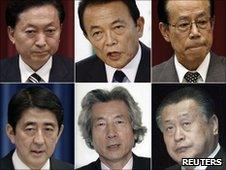Will Naoto Kan break Japan's political mould?
- Published

Many hope Naoto Kan will be a new kind of Japanese leader
When Naoto Kan was born in Ube, a coal-mining town on the edge of the Inland Sea in southern Japan, no-one would have dreamed that he would become prime minister.
He has described himself as a salaryman's son with no special connections.
It is his very ordinariness that marks him out as unusual.
Japan has been dominated by families who have made politics their trade.
Mr Kan's four immediate predecessors were the sons or grandsons of prime ministers.
None of them lasted more than a year in office, and some in Japan believe the new prime minister may have more political longevity.
During the rough and tumble of his climb, the thinking goes, he must have developed more toughness than those whose elite pedigrees gave them a smooth ride to the top.
'Enterprise politics'
Dynasties are not unusual in many parts of the world, but in Japan the way parties are set up makes them more common.
They are not centralised structures but loose federations of koenkai, or personal support groups.

Mr Kan becomes Japan's seventh prime ministers since 2000
"You have to set up your own support group and that is called, formally, the local branch of the party," says Koichi Nakano, associate professor of Political Science at Tokyo's Sophia University.
"Once you have it going there's a reason to want to keep it going. It becomes a small enterprise.
"This is why there are so many hereditary politicians, because you don't want to pass on to someone you don't know the fruits of your years of labour setting up the organisation."
The system has made some constituencies into what amount to family fiefdoms, with seats handed down through the generations.
Favours expected
The best koenkai sink deep roots into their communities.
They make sure the candidate appears at the right weddings, help people get to funerals and sort out disputes between neighbours.
The problem for Japanese politics has been that running these local machines is very expensive.
It is one reason for the funding scandals, such as those that blighted Yukio Hatoyama's eight months as prime minister.
Mr Hatoyama's credibility was damaged when it emerged his Bridgestone Tyres heiress mother had given him millions of yen in undeclared campaign donations.
His party deputy and the power behind the throne, Ichiro Ozawa, has been investigated by prosecutors over a land deal. He has also resigned.
"The constituency associations were always historically involved in deciding where roads got built, where bridges were put, what tunnels got dug, where the railways would go," says Phil Deans of Temple University, Japan.
"That of course meant they had to get in bed with the construction companies, the Ministry of Construction. They would put money into the constituency association in exchange for favours."
No youth influx
The taint of sleaze is one explanation for why many young Japanese have little interest in getting involved in politics.
Local party support groups tend to cater more to the concerns of elderly voters too.
In greying Japan they are a more important vote bank than the young.
"That's not what you do if you care about Japan or care about politics," says Mr Deans, talking about the aspirations of his students.
"The last place you'd go would be a party. I think they're just completely cynical about their ability to actually change something.
"They regard the system as so ossified, so conservative, so caught up in special interests that they'd be wasting their time."
Some hope, however, that the new prime minister might herald a new era.
With no family connections, Mr Kan had to build his support through grass roots activism and several failed runs for parliament.
Optimists point to his reaction when he had to step down as leader of the Democratic Party of Japan when it was in opposition in 2004 over unpaid contributions to a state pension fund.
Mr Kan shaved his head, donned Buddhist garb, and went on a penitential tour of temples on the island of Shikoku, before picking himself up and bouncing back.
Perhaps he, they say, will be the Japanese prime minister that sticks.
- Published8 June 2010
- Published6 June 2010
- Published4 June 2010
- Published26 August 2011
- Published2 June 2010
- Published2 June 2010
- Published30 May 2010